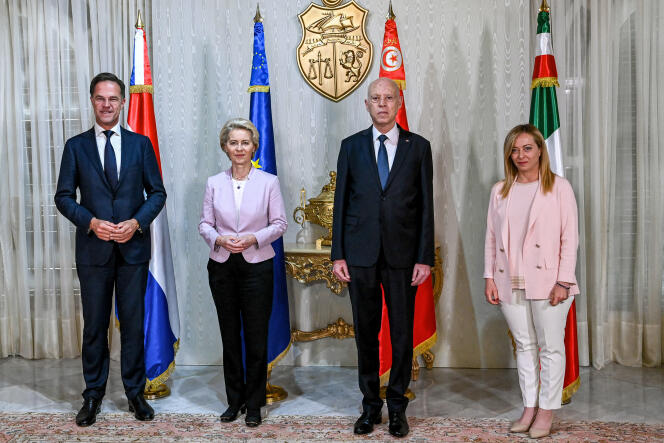


For Giorgia Meloni, Africa is more than a priority. It's a vocation. Taken as a whole, with its natural resources to be developed and its migratory flows to be stemmed, the continent is at the heart of every foreign policy speech made by the Italian leader. Since the early days of her term, Meloni has called for the implementation of a "plan for Africa" in response to the continent's crises. Long shrouded in secrecy, the content of this plan is finally to be unveiled at the Italy-Africa summit to be held in Rome on Sunday, January 28, and January 29. In the presence of at least 12 international organizations and 26 heads of state, heads of government, ministers and other high-ranking officials, the Italian prime minister will detail the nature of the "paradigm shift" she wishes to bring about in relations between Europe and Africa, an undertaking based on the principles of "non-predation" and "cooperation as equals."
In her 15 months in office, from speeches to press conferences, from the podium of the United Nations General Assembly to the stage of her party's annual gathering, Meloni has sketched out the general outline. In her grand narrative of her African project, she argues that massive European investment in the economy of a continent hitherto exploited by malevolent powers will, in the long term, help to tackle the root causes of illegal migration, which she has promised her electorate she will bring under control.
Unlike France, which is in retreat on the continent, Rome, which considers its image intact there, is pleased to escape accusations of neo-colonialism, and is therefore posing as a facilitator of Euro-African relations. For Meloni, both geography and politics predispose the Italian peninsula to becoming a bridge between the two continents. This idea is complemented by a very concrete aspiration to make Italy a hub between African energy resources and European markets.
Meloni refers to her African vision as the "Mattei plan," named after Enrico Mattei (1906-1962), founder of Ente Nazionale Idrocarburi (ENI), the national energy company. A legendary figure of 20th-century Italy, Mattei is as much identified with Italy's post-war industrial development as he is with the virtuous international influence that accompanied the emancipation of the developing world thanks to advantageous contracts for oil-producing countries. He is also known for his support of the National Liberation Front against France during the Algerian War of Independence.
These anti-imperialist overtones from Meloni should come as no surprise. Indeed, her political party is permeated by a Third World vein, particularly strong in the youth organizations where she was training when she made a seminal humanitarian trip to the Western Sahara. In 2019, still in opposition, she also made a name for herself in a clip that went viral, brandishing a 10,000 CFA franc (€15) bill on a television set, denouncing a "colonial currency" blamed for impoverishing Africa.
You have 65% of this article left to read. The rest is for subscribers only.
